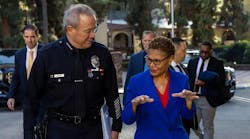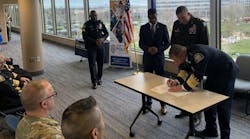It is fairly obvious that law enforcement officers need to be physically fit in order to carry out their duties to the best of their ability. An overweight officer can endanger society, suspects, as well as themselves. Obese officers also pose as liability risks for any law enforcement department. Plus, let's face it, they present a bad public image.
The Obesity Epidemic
Obesity is the #2 cause of preventable death in the United States; smoking is #1. But the race is getting closer. About 66% of U.S. adults age 20 or older are overweight: 62% of women and around 71% of men. Nearly one-third of American adults (60 million people) are so overweight that they are considered obese, meaning they have a BMI greater than 30: 33% of women and 30% of men. Nine million children and teens ages 6-19 are overweight. Americans spend more than $33 billion a year on weight-loss products and services. However, the economic cost of obesity in the United States was about $117 billion in 2000.
Being overweight or obese dramatically increases the risk of health conditions and diseases including: coronary artery disease, cardiac arrest, stroke, diabetes, hypertension, sleep apnea, gallbladder disease, osteoarthritis, colon and breast cancer.
Message from the Previous Surgeon General: Law Enforcement Obesity
In March 2003 previous Surgeon General, Richard Carmona, addressed the National Sheriff's Association about his concerns related to obesity. Carmona said that "being overweight or obese directly impacts job performance when you're trying to defend the public safety. Remember, when you are called upon, you must be ready to back up your partner or a citizen. To me, failing at this calling when challenged would be a fate worse than death." Carmona was previously a full time police officer. "After we got rid of the physical standards," Carmona said, "It was problematic for most of us because I saw many of my peers who didn't do the exercise that they needed to. They didn't stay in physical condition to be out on the streets. And the risk that you entertain is not only for yourself and being not prepared to respond to that worst-case scenario call, but also the potential harm that you put your fellow officers in because you're not physically able to respond appropriately."
Calculating Obesity
The generally accepted standard to measure whether a person is obese or overweight is by using the Body Mass Index, more commonly known as the BMI. Note: Using BMI for athletes can overestimate their level of body fat because muscle is denser than fat and weighs more. There are a number of different ways to measure body fatness. There is a formula for this: divide your weight in pounds by height in inches squared and multiply by a conversion factor of 703. There is an easier way: the BMI calculator. (linked below)
Normal weight consists of BMI in the range of 18.5 to 24.9. If your BMI is under 18.5, you are considered underweight. If your BMI is between 25.0 and 29.9 you are considered overweight. A BMI between 30.0 and 34.9 indicates obesity. Severe obesity is determined if the BMI is between 35 and 39.9. If your BMI is over 40, you are morbidly obese.
These calculations would translate to a six foot tall male police officer having just reached the slightly overweight category at 185 pounds. Upon reaching 225 pounds he would be considered obese.
Why Officers are at Risk for Overeating
Patrol officers frequently have to wolf down their food to complete a meal without being interrupted by a call for service. This does not allow them time to feel full before the plate is clean. If an officer works the second or third watch he or she may have very limited choices on where to purchase food when they feel hungry. Let's face it Circle K, gas stations or the 7-11 primarily offer a feast of sugar and fat. Food can be as comforting for an overeater as a beer is for a drinker. Most overeaters eat to fill a void or deal with stress: from a dispatch call, a demanding supervisor, or personal problems.
Obesity and Compulsive Overeating
While not every obese individual is a compulsive overeater, many are. Compulsive overeating inevitably leads to weight gain and obesity.
Does the cheese cake in the freezer keep calling your name? Can't resist a chip or candy run to a convenience store during your shift? Do you supersize or buy jumbo packages? If so, you may be a compulsive overeater.
Compulsive overeaters are usually aware that their eating habits are abnormal. However, they have an obsession with food and a compulsion to eat. This obsession is demonstrated by spending excessive amounts of time and thought devoted to food, and secretly planning or fantasizing about eating alone. Telling them to go on a diet is about as effective as telling an anorexic to just eat, or heroin addict to just go cold turkey.
Compulsive overeaters will typically eat when they are not hungry and engage in frequent episodes of uncontrolled eating, or binge eating. During a binge a compulsive overeater may consume 5,000 to 15,000 calories per day. They often feel frenzied or out of control, consuming food well past the point of being comfortably full. This is followed by feelings of depression, shame, low self esteem, remorse and guilt. Not all compulsive overeaters binge, others engage in grazing behavior; eating smaller amounts of food (high calorie) throughout the day.
The good payoff is that when compulsive overeaters consume sugary and fatty food they truly enjoy it. In fact they get an addictive high from it. The brain releases endorphins and dopamine that stimulate the individual to eat more of these foods to feel good and to calm him/her down. Unfortunately, left untreated, compulsive overeating can lead to serious medical conditions including death.
Treatment for Obesity and Compulsive Overeating
Approximately 80% of compulsive overeaters who seek professional help recover completely or experience significant reduction in their symptoms. There are several options for people who want help with controlling this disorder. Behavioral therapy is used to help teach individuals how to keep track of their eating and change unhealthy eating habits. Psychotherapy helps compulsive overeaters to look at their interpersonal relationships and make changes in problem areas. Additionally, certain medications can be effective including antidepressant and Topiramate (an anti-seizure medication). In severe cases gastrointestinal surgery may be indicated. Nutritionists can help determine an effective diet plan that an individual can comply with, as well as an exercise regime. There are many self-help groups as well, including Overeaters Anonymous.
Knowing what drives overeating behavior is the first step in changing it. Compulsive overeaters need to change the way they approach food. No one said it was easy.
If you want help, start with your physician. It may be uncomfortable to discuss obesity with anyone, especially your doctor. Know that you are not the first person to enter your doctor's office with this problem. It is usually pretty obvious, and society and your mirror remind you daily. Get a complete physical, lab tests and find out if you are physically healthy enough for certain treatments. If so start an exercise regime, use your department’s gym if they have one. Better yet, invest in a personal trainer, get referrals.
Conclusion:
When a police officer is in poor physical health it can mean the difference between catching the bad guy or giving him a chance for a clean getaway. Remember suspects size you up, just as you do them. Suspects are much more likely to try and flee or resist arrest if they feel that an officer is not going to be able to pursue or defend himself or herself successfully. This leads to the potential that the officer may need to resort to more force than would have been necessary had the officer been in shape. In law enforcement, size does matter.


